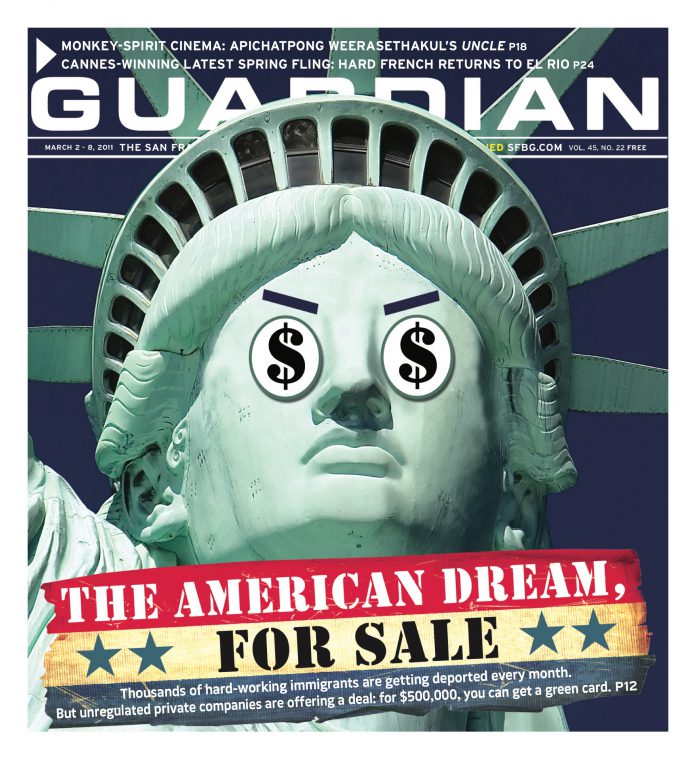steve@sfbg.com
Board of Supervisors President David Chiu launched his mayoral campaign Feb. 28 with a pledge to bring San Franciscans of all political stripes together around a common agenda. It’s a message that has also been sounded by other mayoral candidates, but one in which Chiu is in a unique position to try to deliver on this year.
“This campaign, at its heart, is going to be how we come together,” Chiu told a crowd of hundreds gathered at City Hall for the announcement. Later he told the crowd, “This campaign needs to be a beacon to the rest of the world about who we are as San Franciscans.”
Chiu appeared to be reaching out to progressives more than the other mayoral candidates have so far, emphasizing how he doesn’t own a car and wants make big improvements to Muni and the bicycle network, valuing “diversity and social justice,” calling for “community-based budgeting,” and saying that “we have to have a conversation about how we can creatively fund affordable housing.”
“We are at our best when we come together for our shared progressive values,” Chiu said.
But then he quickly noted that over the past decade, “City Hall has been a bit dysfunctional.” That was a time when progressives controlled the Board of Supervisors and there was a downtown-backed mayor, and Chiu decried how the two sides didn’t work well together. Yet now, with Chiu as board president and Ed Lee as interim mayor — an appointment Chiu helped engineer — “the tone at City Hall has changed.”
Perhaps that’s true, but the thorny issues that divide the city and defy simple solutions remain in play: bridging a $380 million budget deficit after years of deep cuts, creating jobs without worsening the city budget picture, controlling employee pension costs, reforming Muni and addressing traffic congestion, bringing cleaner energy sources online, and increasing the affordable housing stock.
These are all issues that President Chiu and Mayor Lee will have to deal with this year if Candidate Chiu is going to be able to credibly claim that the new tone at City Hall can actually translate into policies that work and bring people together.
And there won’t be consensus in the community on all of those issues; at some point, Chiu will have to take a side.
RHETORIC AND REALITY
All the mayoral candidates argue for coming together around common-sense solutions, a trope that clearly polls well with voters.
Leland Yee welcomed Chiu into the race while emphasizing his own kumbaya message: “My commitment is to run a different kind of campaign for mayor — to work with other candidates to present real choices and options for voters.”
Dennis Herrera, whose mayoral campaign announced its endorsement by Sup. Scott Wiener during Chiu’s kickoff event, said, “I look forward to working with him toward my goal of making San Francisco a city that works and one that lives up to its great promise”
And Ting told a gathering of his Reset SF group over the weekend, “It’s time for San Francisco city government to be as creative and innovative as the rest of San Francisco. And it’s going to take all of us to make that a reality.”
Even political consultant David Latterman, who usually works with downtown-backed candidates but is working on Chiu’s campaign, told us, “I’m just so tired of that left-right divide. I don’t think this city is served well by those wars any more.”
But Chiu is uniquely positioned to turn that rhetoric into a reality at City Hall — if it’s possible. Over the past two years, he took the lead on challenging bad budget proposals from the Mayor’s Office and the San Francisco Municipal Transportation Agency, only to back down in the end and make compromises that many of his progressive colleagues opposed. Similarly, he spent months working on a business tax reform measure that would have raised city revenue without costing private sector jobs, only to abandon it in the face of big business opposition.
This year, some progressives are banking on Chiu to deliver on their issues and have offered his mayoral campaign their early support.
“He’s willing to take bold moves to make Muni continue to improve,” MTA Commissioner and cycling activist Cheryl Brinkman told the gathering.
“There is no one running for mayor who has David’s zeal for social and environmental justice,” Fei Tsen, chair of Chinatown Community Development Corporation — a core Chiu constituency — told the gathering.
“I think he’s the right choice for low-income communities of color,” Planning Commission Christina Olague said at the event.
Sup. Eric Mar, the only elected official at Chiu’s kickoff, told the crowd that “David Chiu has shown he has the ability to bring communities together,”
But the rest the progressive community, from elected officials like Assemblymember Tom Ammiano and Sup. David Campos to the leading advocates for renters, environmentalists, and the social and environmental justice movements, are still waiting to see what happens this year. Many are disappointed that Chiu is pushing tax breaks for Twitter and other corporations rather than progressive budget solutions, as well as putting moderate supervisors in control of some key board committees.
In an era of fiscal desperation, it may not be possible to bring progressives and downtown together around a common agenda. But if Chiu wants to try, voters are likely to learn whether that approach works even before they head to the polls in November.

